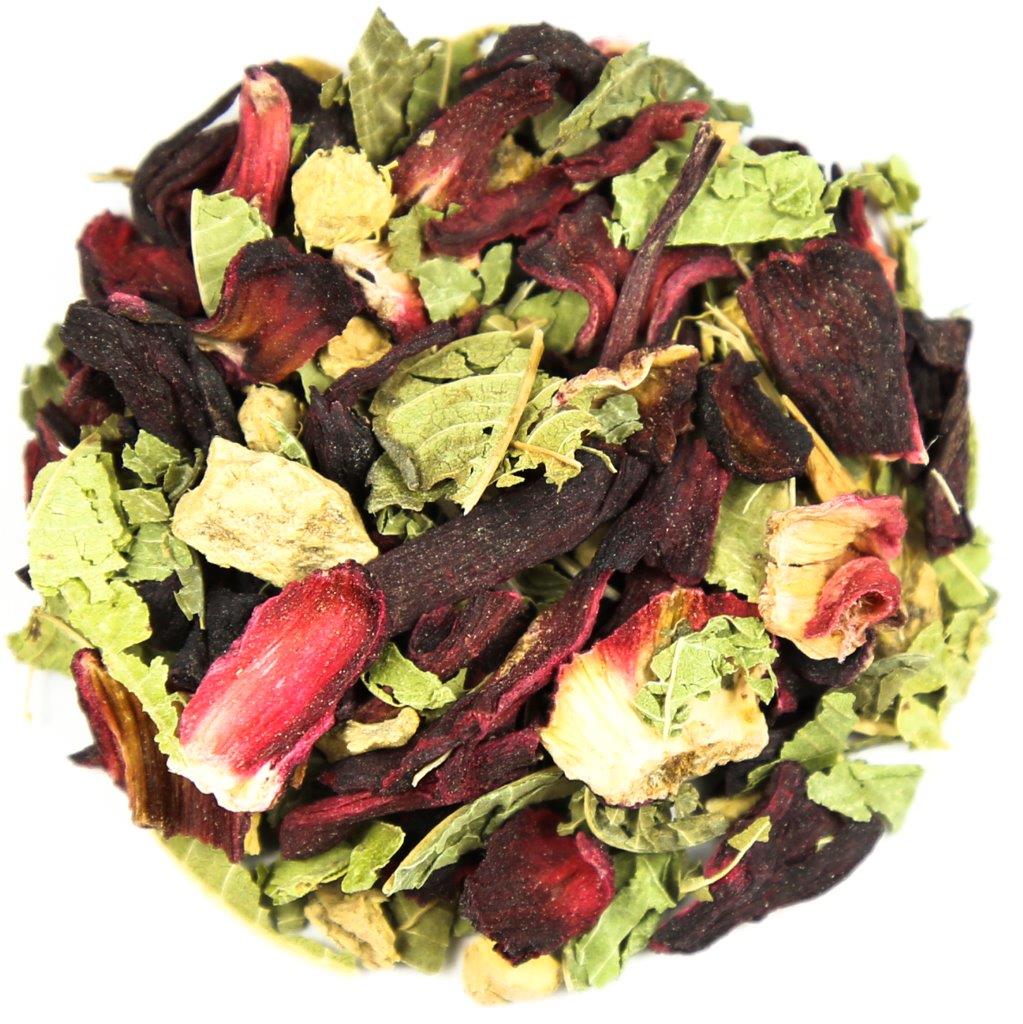Combine three of the tastiest and most health-beneficial herbs known worldwide, and one has our Lemon Verbena, Hibiscus and Ginger Tea. Each ingredient has a unique quality that comes through clearly in taste. Lemon Verbena boasts a bold citrusy flavour. Hibiscus offers complex tartness. And Ginger adds a hint of spiciness.
These tasting notes infuse perfectly, creating a blend like no other. What’s more, they provide remarkable benefits when enjoyed as part of a healthy and active lifestyle. According to the latest scientific research, Hibiscus can lower blood pressure. Ginger, meanwhile, can support the immune system. Finally, Lemon Verbena can improve joint function.
There are many reasons to choose this sensational infusion. You can discover them all today with The Kent and Sussex Tea and Coffee Company. We pack everything fresh to order, which ensures not only quality but also consistency. This is our guarantee. It applies to all of our products, including, of course, Lemon Verbena, Hibiscus and Ginger Tea.
Lemon Verbena
This aromatic, perennial shrub is native to South America. Despite its distinctly lemony taste and aroma Lemon Verbena it is not related to the renowned citrus fruit. It can grow to heights of up to three metres. Its leaves, meanwhile, reach lengths of up to 8 centimetres. These leaves, in particular, exude the plant’s trademark scent.
Lemon Verbena flourishes in fertile soils with good drainage. It requires warm and humid climates to grow to its full potential. It also prefers sunlit areas with sheltered positioning. Many products contain this alluring plant, including perfumes, potpourris and, of course, Tea. Here at The Kent and Sussex Tea and Coffee Company, we prefer the latter.
Hibiscus
Hibiscus is a genus of hundreds of flowering plant species belonging to the Mallow family, Malvaceae. We use the Hibiscus sabdariffa variety, in particular, when making Hibiscus Tea blends. It grows in abundance across much of the world, including in Africa, Europe and North America. The flowers produce a flavour similar to that of pomegranates and cranberries.
The history of Hibiscus Tea benefits began in Ancient Egypt. Pharaohs consumed Hibiscus Tea to combat the fierce scorn of the desert heat while cruising along the river Nile. Today, many choose to drink it because, put simply, it tastes great.
Ginger
Ginger belongs to the Zingiberaceae family. It no longer grows in the wild but is nevertheless widely cultivated owing to its immense popularity. In fact, it is one of the most famous spices in the world. Its outstandingly zingy flavour comes specifically from the rhizome of the ginger plant, better known as a root.
This herb has long had a close association with both Traditional Chinese Medicine (TCM) and Indian Ayurveda. Today, science likewise recognises its potential for improving everyday life. This is mainly due to its ability to ward off colds and the flu.
Useful Information
Type of Tea: Herbal Tea.
Ingredients: Lemon Verbena Leaves, Hibiscus Flowers and Ginger Root.
Brewing Instructions: Brew using freshly boiled water. Infuse for 5 to 10 minutes.
How to Serve: This wonderful fusion of flavour tastes best without further additions.
Tasting Notes: Lemon Verbena, Hibiscus and Ginger Tea has strong citrusy notes with herbaceous undertones. It is a sweet, well-balanced infusion from start to finish.
Colour in Cup: Reddy-purple liquor, light in tone.
Lemon Verbena Hibiscus and Ginger Tea Benefits
Are you looking to lower your blood pressure? Look no further than Lemon Verbena, Hibiscus and Ginger Tea. The crucial ingredient, hibiscus, has long had a close association with lowering blood pressure. A study conducted by the American Heart Association (AHA) has the answers.
It saw sixty-five people aged between 30 and 70 split into two groups. Both groups had abnormally high blood pressure, but only one received hibiscus.
After six weeks, the results determined that the Hibiscus group “showed an average fall of 7.2 percent in blood pressure, with some recording a 13.2 percent drop. In comparison, the placebo group recorded only a 1.3 percent drop”. How did this work? Scientists credit it to the anti-inflammatory properties of this herb. It can improve the elasticity of the body’s blood vessels, as well as their ability to dilate.


 Loose Leaf Tea
Loose Leaf Tea Pyramids
Pyramids Tea Bags
Tea Bags Africa
Africa Assam
Assam Ceylon
Ceylon Chinese
Chinese Darjeeling
Darjeeling European
European Indian
Indian Japan
Japan Nepal
Nepal South East Asia
South East Asia Ayurveda Tea
Ayurveda Tea Black Tea
Black Tea Chai Tea
Chai Tea Flowering Tea
Flowering Tea Fruit Tisanes
Fruit Tisanes Green Tea
Green Tea Herbal Tea
Herbal Tea Matcha Tea
Matcha Tea Oolong Tea
Oolong Tea Organic Tea
Organic Tea Pu erh Tea
Pu erh Tea Rooibos Tea
Rooibos Tea White Tea
White Tea Asian Coffee
Asian Coffee Caribbean Coffee
Caribbean Coffee Central American Coffee
Central American Coffee South American Coffee
South American Coffee Coffee Blends
Coffee Blends Decaffeinated Coffee
Decaffeinated Coffee Espresso Coffee
Espresso Coffee Ethically Sourced Coffee
Ethically Sourced Coffee Flavoured Coffee
Flavoured Coffee Organic Coffee
Organic Coffee Single Origin Coffee
Single Origin Coffee Chocolate 1
Chocolate 1 Chocolate 2
Chocolate 2 Chocolate 3
Chocolate 3 Chocolate 4
Chocolate 4 Chocolate 5
Chocolate 5 Chocolate 6
Chocolate 6 Chocolate 7
Chocolate 7 Chocolate 8
Chocolate 8 Chocolate 9
Chocolate 9 Loose Tea Filters
Loose Tea Filters Tea Accessories
Tea Accessories Tea Bricks
Tea Bricks Tea Caddies
Tea Caddies Tea Caddy Spoons
Tea Caddy Spoons Tea Gift Ideas
Tea Gift Ideas Tea Infusers
Tea Infusers Tea Strainers
Tea Strainers




